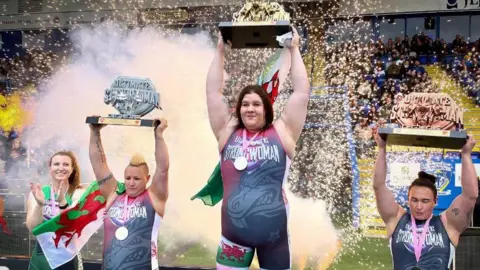 Harry Collins
Harry Collins“We promote the fact that we are different… not the stereotypical woman.”
Welsh strongwoman Rebecca Roberts – the current reigning World champion – said it took years to understand that her 6ft 4in (1.93m) height was a “superpower”.
As a teen, in Bangor, Gwynedd, the 29-year-old said she was so badly bullied for her size she used to write sick notes to avoid PE.
“If you were to tell me back then I would be the UK’s strongest woman competing in an arena full of thousands of people I would have laughed… no chance.”
Rebecca won her third consecutive UK’s Strongest Women competition in Warrington, Cheshire, on Sunday, beating fellow Welsh strongwoman Sam Taylor.
“It was really good to see that Wales was one and two on the podium,” she said.
She said she hoped it would inspire more young girls to get into sports, or even compete in strongwoman competitions.
Second placed Sam, 46, from Aberdare, Rhondda Cynon Taff, said: “It was a very, very proud moment.”
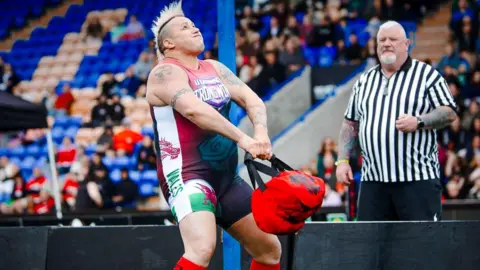 Harry Collins
Harry CollinsBoth women said they have had overcome terrible life traumas to get to where they are.
“I was always a lot bigger than my peers, a very tall girl,” Rebecca said. “I was bullied for my difference.”
“I would write notes to get out of PE, because that was something that I just didn’t have the confidence to do.”
She was put in social care at the age of 12 and was then raped at knifepoint in her second year of university in Liverpool.
She gained 10 stone and tried to take her own life before finding strong women through a former competitor Paul Savage.
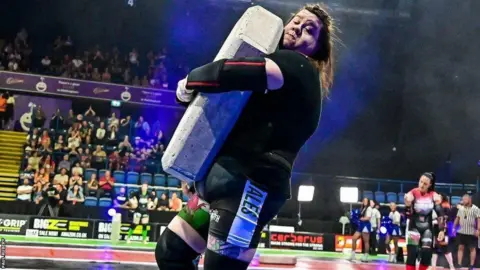 Paul Rubery
Paul RuberyShe said she remembered being “astounded” at university when she met other women her size and “found her society” with strong women.
“I love who I am,” she said, explaining how she wants to help other women to not feel ashamed of their bodies they way she did when she was younger.
“Different body types are out there and being different isn’t always bad,” she said.
“It just means you’ve got a different superpower to use in your own way, and everybody should be celebrated.”
Paul became her coach and then partner on the way to her first UK’s Strongest Woman title in 2016.
Rebecca went on to win five more titles in UK, European and world competitions before Paul’s sudden death in 2022.
“The most horrible things can happen to you but you can still find beauty in this world,” she said, explaining how she now competes in Paul’s memory.
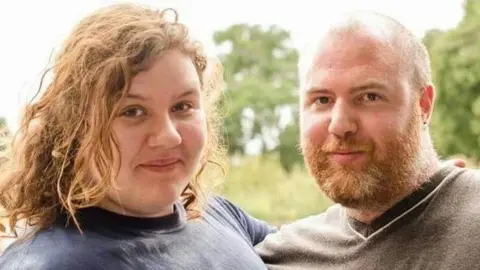 Rebecca Roberts
Rebecca RobertsSam’s pathway to strong women began in the gym in 2016 when she was trying to find a way improve her mental health following an abusive relationship and a suicide attempt.
“I sort of woke up from that and thought, well, ‘I didn’t die for a reason’,” she said.
At first, she would only got to the gym after midnight because she felt so self-conscious.
But, like Rebecca, she met a coach who recognised her potential and just two years after lifting her first weight she entered her first strong woman event and was hooked.
“It’s given me a life that I never ever imagined,” she said.
The gym also helped her find love again – it’s where she met her future wife Sue Franklin.
Not to be outdone, Sam said Sue was soon competing in strong woman events herself and the pair have performed several feats of strength as the UK’s strongest couple, including towing a passenger jet.
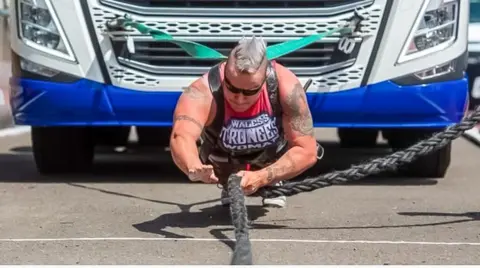 Sam Taylor
Sam TaylorSam now runs an “inclusive” gym for people who feel intimidated by the gym experience.
“To see the women coming in through the door for their first time – and we’ve got one lady who’s in her sixties – it just blows my mind.”
However, Sam said she has faced hateful comments online, including those questioning her gender.
“It makes me laugh, but because I’m very secure in in who I am,” she said.
“It does make me sort of question how far we’ve come as a society when we still can’t accept that women can look different.”
After her second place finished in Warrington, Sam said her inbox was flooded with questions from people such as “I’m overweight. I’m going through the menopause can you help me?”.
“We’re like, ‘Yes, absolutely we can’, and then it makes it all worth it,” she said.
“We are strong, we are powerful,” said Rebecca, adding that it is a view of women that is still met with some resistance.
“But now it’s getting so much more popular and women are starting to realise we don’t have to follow society’s stereotype of what a woman should be,” she said.
She remembered early strong woman events being “held in a car park” and winning out-out-date protein powder as a first place prize.
Now she is competing for “six figure” purses.
It is not enough to pay all her bills – Rebecca also works as a quality assurance analyst – but she said she hopes one day it could be a full time career.
“My long term goal is to be regarded as the strongest woman to have ever lived,” she said, aiming to win the world’s strongest woman competition a record five times.
She already has two.
If you have been affected by any of the issues raised in this story you can visit BBC Action Line.

